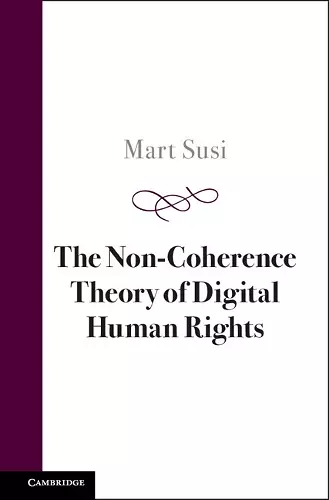The Non-Coherence Theory of Digital Human Rights
Format:Hardback
Publisher:Cambridge University Press
Published:29th Feb '24
£95.00
Supplier delay - available to order, but may take longer than usual.

The non-coherence theory of digital human rights has wide academic and practical implications for conceptualization of the digital sphere.
Susi offers a novel non-coherence theory of digital human rights. It explains the change in meaning and scope of human rights rules, principles, ideas and concepts, and the interrelationships and related actors, when moving from the physical domain into the online domain.Susi offers a novel non-coherence theory of digital human rights to explain the change in meaning and scope of human rights rules, principles, ideas and concepts, and the interrelationships and related actors, when moving from the physical domain into the online domain. The transposition into the digital reality can alter the meaning of well-established offline human rights to a wider or narrower extent, impacting core concepts such as transparency, legal certainty and foreseeability. Susi analyses the 'loss in transposition' of some core features of the rights to privacy and freedom of expression. The non-coherence theory is used to explore key human rights theoretical concepts, such as the network society approach, the capabilities approach, transversality, and self-normativity, and it is also applied to e-state and artificial intelligence, challenging the idea of the sameness of rights. This title is part of the Flip it Open programme and may also be available Open Access. Check our website Cambridge Core for details.
ISBN: 9781009407700
Dimensions: 235mm x 158mm x 24mm
Weight: 640g
340 pages